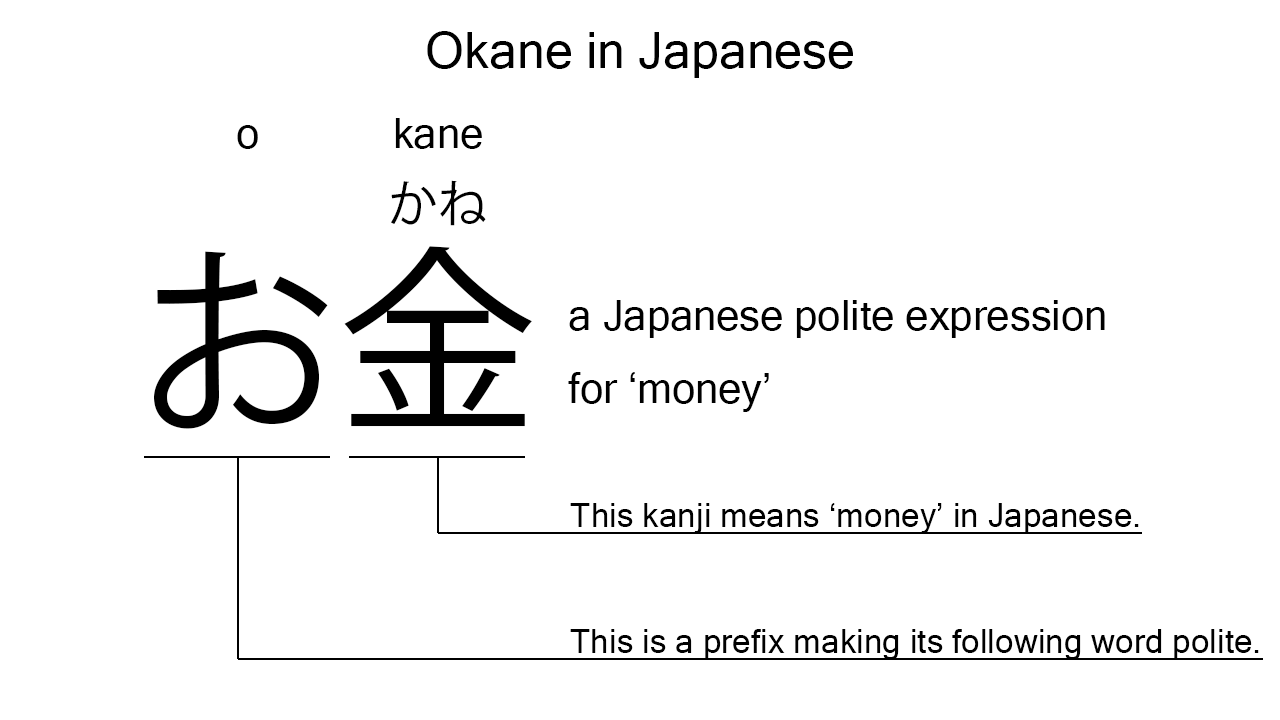What does “okane” mean in Japanese?
Native speakers use okane to mean ‘money’ in Japanese. Probably, many Japanese learners know this word as it is often used in Japanese conversations. In this blog post, however, I will explain this word in detail based on its kanji mixed expression. And also, I will explain how to use it through example sentences. My explanations would help Japanese learners understand okane more clearly. Then, let’s get started!
Contents
Definition and meaning of “okane”
Let me start with the definition and meaning of okane.
- okane – お金 (おかね) : a noun meaning ‘money’ in Japanese.
Again, but native speakers use this noun to refer to money in Japanese. They often use this in daily conversations.
The definition and meaning are simple and clear. To understand this noun more clearly, however, let me explain its kanji mixed expression in detail.
Okane in kanji
The kanji mixed expression of okane consists of the following two characters:
- o – お : a prefix making its following word polite.
- kane – 金 (かね) : a noun meaning ‘money’ in Japanese.
From these two characters, we can understand that okane is literally the polite expression for ‘money’. And actually, it is. Japanese people normally show their respect to money. They are slaves of capitalism.

When we meet new Japanese words, we should check their characters in detail to understand their meanings clearly and deeply. In many cases, characters tell us a lot about the meanings of the words they form. Actually, here, we could get the better understanding of okane through the detailed check above.
So far, I’ve explained the definition and meaning of okane together with its characters. Then, let me explain how to use it through the example sentences below.
How to say “money” in Japanese
boku wa takusan okane wo tsukat ta – 僕はたくさんお金をたくさん使った (ぼくはたくさんおかねをつかった)
I spent a lot of money.
Below are the new words used in the example sentence.
- boku – 僕 (ぼく) : a pronoun meaning ‘I’ in Japanese. This is used mainly by boys and young males.
- wa – は : a binding particle working as a case marker or topic marker. In the example, this works after boku to make the subject in the sentence.
- takusan – たくさん : an adverb of quantity meaning ‘a lot’, ‘many’, ‘much’, or such in Japanese.
- wo – を : a case particle used to make the object word in a sentence. In the example, this is used after okane to make the object in the sentence.
- tsukat – 使っ (つかっ) : one conjugation of the verb, tsukau, which means ‘to use’ in Japanese. In the example, it has been conjugated for the better connection with its following word.
- ta – た : an auxiliary verb used after a verb, adjective, or auxiliary verb to make its past tense form. Probably, this is well known as a part of Japanese ta form. In the example, this is used after tsukat to make its past tense form, tsukat ta.
This is a typical usage of okane. In this example, it works as a part of the commonly-used phrase, okane wo tsukat ta, which literally means ‘to have used money’ in Japanese. This phrase is normally translated into English as ‘to have spent money’, though.
Another example of “okane”
kore wa okane no mondai desu – これはお金の問題です (これはおかねのもんだいです)
This is a matter of money.
Below are the new words used in the example sentence.
- kore – これ : a demonstrative pronoun used to refer to something close to the speaker. In the example, this is used to mean ‘this’ in Japanese.
- no – の : a case particle joining two nouns. Normally, the first one can work as a modifier to describe the second. In the example, this works to join okane and mondai. The formed phrase literally means a ‘matter of money’ in Japanese. Word orders in Japanese and English are different, but the role of this case particle is similar to that of the English preposition, of.
- mondai – 問題 (もんだい) : a noun meaning a ‘problem’, ‘matter’, or such in Japanese. This can also work as plural. Learn more about Japanese plural.
- desu – です : an auxiliary verb used after a noun or adjective to make it polite. Probably, this is well known as a part of Japanese desu form. In the example, this is used after the noun phrase, okane no mondai, to make it sound polite.
This is another example of okane. In this example, it works as a part of the noun phrase, okane no mondai, which literally means a ‘matter of money’ in Japanese. When we want to mean ‘money’ in Japanese, anyway, this noun is always a very good option.
Summary
In this blog post, I’ve explained the definition and meaning of okane in detail based on its kanji mixed expression. And also, I’ve explained how to use it through the example sentences. Let me summarize them as follows.
- okane – お金 (おかね) : a noun meaning ‘money’ in Japanese. O is a prefix making its following word polite; kane means ‘money’ in Japanese. So, this is literally the Japanese polite expression for ‘money’. And actually, it is. Japanese people normally show their respect to money. They are slaves of capitalism. When we want to mean ‘money’ in Japanese, anyway, this noun is always a very good option.
Hope my explanations are understandable and helpful for Japanese learners.
Leave a Reply